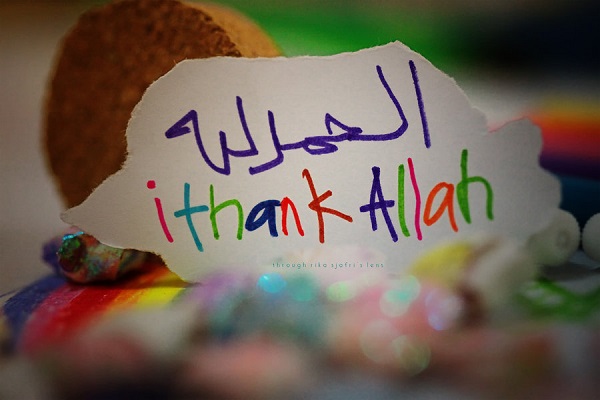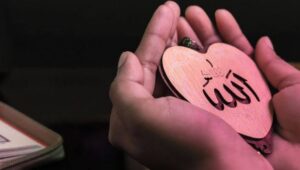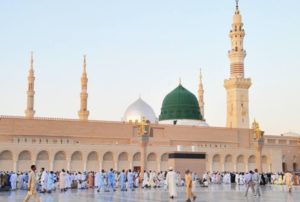 By Jinan Yousef/Muslimvillage.com
By Jinan Yousef/Muslimvillage.com
The Prophet ﷺ (peace be upon him) said: “Allah subhanahu wa ta`ala [exalted is He] is Jawād and He loves those who are magnanimous in giving. He loves excellent moral character and detests meanness.” (Bayhaqi)
Today I am going to be talking about two of Allah’s Names that focus on different aspects of His Generosity. The first is His Name al-Jawād and the second is His Name al-Mannān.
Al-Jawād comes from the root j-w-d (ج-و-د) and it means something plentiful or magnanimous. Jawād is the name given to a strong and fast horse, and jawd is heavy, pouring rainfall. The Prophet ﷺ taught us that, “Allah’s Hands are full, and that fullness is not diminished by His giving day and night…” (Muslim)
Also Read: Imaam Yakhsyallah: Nurture Love for the Prophet, One Will Be with Whom One Loves
Just like a heavy rain that falls and nourishes everything, Allah’s giving is like that and more. Blessings rain on us every single day and we do not even notice. Al-Jawād is the One who is magnanimous in spirit and magnanimous in giving.
Something happened to me a few years back, when I visited Boston, which highlighted to me how Allah manifests His Names in our lives. I was taking the underground, called the “T”, with a friend. The way the system operates is that you need a card to touch in, but you do not need it to leave, so you only pay a flat rate upon entry. My friend touched in, and as I tried to, it turned out that my card did not have enough money in it. As I turned around to top-up my card, out of nowhere, a stranger came and used her card to let me in. I was startled, and she gave me a big smile and left.
The funny thing is that, in that period in my life, I was not in the best spiritual state. So I could not view it as a reward or appreciation for any good I may have done; that is Allah al-Jawād, who rains His blessings down even on sinners. He is Magnanimous in spirit and Magnanimous in His giving. We all breathe in air out of His magnanimity, whether we are good or bad people. Allah gives freely, as we are told in the Qur’an:
“Nay, both His Hands are widely outstretched. He spends (of His Bounty) as He wills.” (Qur’an, 5:64)
Also Read: Thanksgiving: An Islamic Perspective
The Greatest Blessing
One of the Companions of the Prophet ﷺ once called to Allah (swt), saying:
“O Allah, I ask you as all praise is Yours. There is no god except You, You are al-Mannān [the Bestower], the Originator of the Heavens and Earth, Possessor of Majesty and Honor. O the Ever-Living, O Self-Subsisting.”
The Prophet ﷺ heard him and said: “He has supplicated to Allah using His Greatest Name; when supplicated with this Name, He answers, and when asked with this Name, He gives.” (Abu Dawud)
Also Read: Achieving the Position of Fasting Expert with Kindness of Morality
Recently, I bought something really beautiful. I was not sure if I was going to buy it, but somehow, I got it just before `Eid. Whenever I see it, I smile because I feel like it was an `Eid gift from Allah (swt).
It is always nice to look at the things that you have – from something as small as a bag, to the family and friends you have—and know that their ultimate source is Allah (swt), and be grateful to Him for His gifts.
Previously in this series, we have talked about Allah the Giver of Gifts and the Provider. This Name shows us a different form of His giving: it is Allah al-Mannan. I will translate it for ease as the Bestower, butinsha’Allah (God willing) we will delve deeper into its meaning here.
The word mann (منّ) comes from the root m-n-n (م-ن-ن) and is an intense form of the word, which means to cut something and leave with it. Allah (swt) says in the Qur’an:
Also Read: The Power of Charity in Ramadan
“And indeed, for you is a reward uninterrupted.” (Qur’an, 68:3)
The word mamnoon has been translated as uninterrupted, meaning a reward that is not ‘cut off’. Al-Mannān is an intensified form of the root and means to give freely or liberally.
At the surface, this Name may not seem any different from His Name the Most Generous (al-Kareem), who gives much more than expected or deserved. What is interesting though is how Allah (swt) uses the verb form of the word in the Qur’an:
“Certainly did Allah confer great favor [manna] upon the believers when He sent among them a Messenger from themselves, reciting to them His verses and purifying them and teaching them the Book and wisdom, although they had been before in manifest error.” (Qur’an, 3:164)
Also Read: Ramadan Brings the Change
Allah (swt) reminds us of the status of the Prophet ﷺ by using the word “mann“. When we look at the world around us, we realize that in terms of material things, Allah (swt) has given things to different categories of people. Some of the most corrupt people are extremely wealthy, and so are some generous philanthropists. Material wealth, which we understand as ultimately from God, does not reflect one’s spiritual standing with Him.
When Allah (swt) refers to His favors in the form of mann, an intense giving, He talks about those favors related to the Hereafter. He tells us that he has favored us by giving us a messenger who is from us, who purifies us and teaches us (Qur’an, 3:164). In another verse, Allah (swt) says:
“They consider it a favor to you that they have accepted Islam. Say, “Do not consider your Islam a favor to me. Rather, Allah has conferred favor upon you that He has guided you to the faith, if you should be truthful.”” (Qur’an, 49:17)
It is easier to remember to be grateful for material and emotional blessings because we reap the benefits in the present. But Allah (swt) reminds us of everything He gives us, and particularly the gifts related to our connection with Him in this life that lead to being with Him in the Hereafter. It is a blessing we sometimes take for granted. The ability to turn to Him, to seek wisdom and comfort from the Qur’an, and to learn from the example of the Prophet ﷺ; these are all great gifts from al-Mannān.
Also Read: Ramadan, the Month of Education
Allah (swt) also tells us in the Qur’an about people on the Day of Judgment:
“They will say, “Indeed, we were previously among our people fearful [of displeasing Allah ]. So Allah conferred favor (fa manna) upon us and protected us from the punishment of the Scorching Fire. “” (Qur’an,52:26-27)
The greatest mann from Allah (swt) is ultimately Paradise. For the very little that we do, we are given something that no language has the words to describe. May Allah (swt) make us all of the people of Paradise.
Connecting to al-Jawād and al-Mannān
Also Read: Come on Do I’tikaf
1- Be Magnanimous.
It was said about the Prophet ﷺ that “when it came to doing good, he was the most magnanimous (ajwad) of people, and he was at his utmost magnanimity during the month of Ramadan,” (Bukhari). Be magnanimous in spirit, and be magnanimous in giving. Nothing you give is ever lost.
2- Reflect on the material gifts and emotional gifts, but also reflect on and be grateful for the spiritual gifts.
The greatest gifts we have been given are the spiritual gifts. Wealth may or may not be accompanied by peace of mind in this world, and ultimately, we will be asked about what we spent our wealth on. But the gifts of closeness to Allah (swt) are truly the ones to be cherished. Reflecting on these blessings is one of the ways to increase our love for Allah (swt).
Also Read: During Ramadan, Merit and Good Deeds are Multiplied
3- Ponder over the gift of the Prophet ﷺ.
Allah reminds us that one of His gifts to us is the Prophet ﷺ. Learn from the Prophet’s ﷺ character and study his seerah (biography) to understand why Allah (swt) told us that the Prophet ﷺ was given to us as a favor from the Most High.
4- Do not be a person that constantly reminds people of the favors that you have done for them.
There are two types of mann: in action and in speech. Mann, as an action from Allah (swt), has a sweetness to it because its Giver is the One who gives freely and is the most generous. Moreover, His reminders cause us to return to Him, and returning to Him results in more blessings. This mann as an action is specific to Allah (swt) because of the perfection of His gifts. Then there is the mann of speech, when people remind you of their favors upon you. Allah (swt) tells us, “Do not invalidate your charities with reminders (mann) or injury,” (Qur’an, 2:264). When you give, remember that your intention is for Allah (swt), and do not remind people of the things you have done for them. (P007/R03)
Also Read: Ramadan, The Month of Jihad
Mi’raj Islamic News Agency (MINA)



































 Mina Indonesia
Mina Indonesia Mina Arabic
Mina Arabic